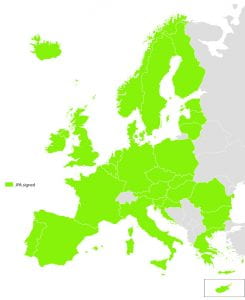By Prof Elspeth Guild, Queen Mary University of London and Kathryn Allinson, Research Assistant, Queen Mary University of London and Teaching Associate, University of Bristol.
 On 3 March 2020, the heads of the key EU law-making institutions met at the Greek-Turkish border to support the efforts of the Greek border guards in pushing back and refusing crossing to a number of people (apparently not Turkish or Syrian nationals) seeking to flee Turkey and enter the EU. On 4 and 6 March respectively, the EU Councils for Home Affairs and Foreign Affairs, made statements applauding the action of the four heads of EU institutions in support of Greek border guards stating “The EU and its Member States remain determined effectively to protect the EU’s external borders. Illegal crossings will not be tolerated.”
On 3 March 2020, the heads of the key EU law-making institutions met at the Greek-Turkish border to support the efforts of the Greek border guards in pushing back and refusing crossing to a number of people (apparently not Turkish or Syrian nationals) seeking to flee Turkey and enter the EU. On 4 and 6 March respectively, the EU Councils for Home Affairs and Foreign Affairs, made statements applauding the action of the four heads of EU institutions in support of Greek border guards stating “The EU and its Member States remain determined effectively to protect the EU’s external borders. Illegal crossings will not be tolerated.”
The problem in international law with the actions of the Greek border guards, and their encouragement by the four heads of the EU institutions, is that they are not consistent with the obligations of the Member States and the EU (as stated in Article 78(1) Treaty on the Function of the European Union). This provision states that the EU is committed to respecting the UN Convention Relating to the Status of Refugees 1951 and the 1967 Protocol. Article 33 of that Convention provides that ‘no one shall be sent back to a state where he or she is at risk of persecution.’ This principle of non-refoulment is thus protected in international refugee law but is also a non-derogable obligation under international human rights law and considered to have customary law status. (more…)









